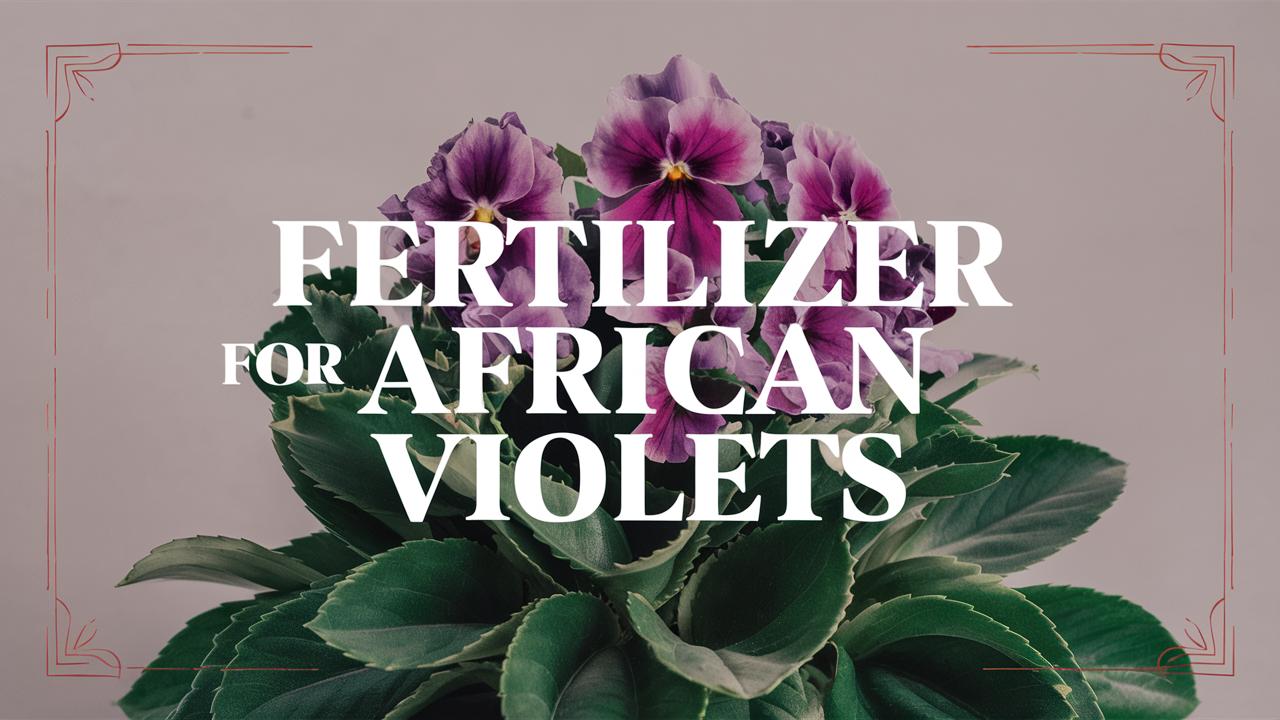In this guide, we will explore the best practices and considerations for selecting the most suitable fertilizer for your African violets, allowing you to enjoy their beauty to the fullest.
Fertilizer For African Violets
| Image | Name | Rating | Shop |
|---|---|---|---|
 | Espoma Violet! Plant Food |  | |
 | EarthPods |  | |
 | African Violet Fertilizer |  |
Espoma Violet! Plant Food
The Espoma Organic African Violet Mix is a great choice for potting soil when growing African Violets and indoor flowering plants. This mix combines sphagnum peat moss, humus, and perlite to provide optimal aeration and drainage, helping your plants thrive.
If you’re using this mix in combination with the Espoma Organic Violet! Liquid Plant Food Concentrate, you can expect fast results from bigger plants with more vibrant blooms. Simply add ½ cap of the liquid fertilizer per quart of water, thoroughly drench the soil, and reap the benefits every 2-4 weeks. As an organic gardening option, this combo pack is free of synthetic chemicals, using only natural ingredients to help your plants grow healthy and strong.
EarthPods
For those looking for an effective and easy-to-use fertilizer for their African Violets, we recommend trying out EarthPods. This product is specifically designed to support the robust growth and blooming of African Violets and other flowering house plants.
With 100 concentrated EarthPods included in each tube, you can easily fertilize your plants without the mess or hassle of liquid fertilizers. Simply push one EarthPod into the potting soil near the base of the plant, water as usual, and let the proprietary formula do its work. Made with a range of organic nutrients, trace minerals, and humates, these fertilizer spikes will help keep your African Violets thriving for years to come.
African Violet Fertilizer
For those looking to give their African Violets a boost in terms of foliage, stems, and blooms, Jack’s Classic 12-36-14 African Violet Water-Soluble Fertilizer with Micronutrients could be worth considering.
This fertilizer is particularly useful due to its water-soluble powder formula, which can be mixed and applied either as a foliar spray or through a root feed system. Its inclusion of micronutrients also means that users don’t need to worry about additional feeding beyond initial application. Measuring the right amount is simplified thanks to the included spoon, while the powdered concentrate provides coverage for multiple gallons of fertilizer.
African Violet Bloom Fertilizer.
African violets require a special type of fertilizer to promote healthy growth and blooming. The Schultz African Violet Plus Liquid Plant Food 8-14-9 is a great option to consider.
This specially formulated plant food provides the necessary nutrients for African violets, including basic micronutrients that stimulate beautiful flower production. As described in the product listing, this fertilizer has been designed specifically with African violets and other blooming plants in mind. A 2-pack is available, making it a convenient option to stock up and ensure your African violets continue to thrive.
African Violet Fertilizer can be simplified to: Violet Fertilizer.
A fertilizing option suitable for African Violets is TPS NUTRIENTS African Violet Fertilizer. This liquid formula provides necessary nutrients such as phosphorus to promote healthy blooms.
This fertilizer from TPS NUTRIENTS can be applied directly to the soil or used in a water solution to provide indoor flowering plants, including African Violets, with essential nutrients for growth and development.
Violet! Plant Food Liquid
Espoma’s Organic Violet! plant food is a great choice for fertilizing African Violets. This concentrated formula makes it easy to provide your plants with the nutrients they need to thrive. Simply add the recommended amount to water and drench the soil thoroughly.
This liquid fertilizer promotes vigorous growth and blooming in African Violets, and best of all, it’s safe to use around kids and pets. With essential plant nutrients and a gentle formula, Espoma’s Organic Violet! is an excellent option for anyone looking to give their plants a boost without compromising on safety or quality. For optimal results, be sure to follow the instructions and apply every 2-4 weeks as directed.
Miracle-Gro Blooming Houseplant Food
The Miracle-Gro Blooming Houseplant Food is a reliable choice when it comes to fertilizing your African Violets. This liquid fertilizer contains essential nutrients that promote blooming in houseplants, including African Violets, which are known for their vibrant flowers.
I recommend using the Miracle-Gro Blooming Houseplant Food once a week during the spring and summer months by applying it directly to the soil or mixing it with water before watering. This product is also great for fertilizing other blooming indoor plants like anthuriums, amaryllis, peace lilies, and geraniums. With its ease of use and effectiveness in promoting blooms, the Miracle-Gro Blooming Houseplant Food is a worthwhile investment for any African Violet enthusiast.
How to Choose a Fertilizer for African Violets
African violets (Saintpaulia) are beloved houseplants, known for their vibrant blooms and lush green leaves. These charming perennials are not only visually appealing but also relatively easy to care for, which makes them a favorite among both novice and experienced gardeners. To ensure that your African violets thrive and produce beautiful flowers, choosing the right fertilizer is essential.
Understanding the Nutritional Needs of African Violets
Before delving into the specifics of fertilizers, it’s important to understand what African violets actually need to thrive. Like all plants, African violets require three primary macronutrients: nitrogen (N), phosphorus (P), and potassium (K), often referred to as N-P-K. Each of these nutrients plays a vital role in the overall health of the plant:
Nitrogen promotes lush green foliage and supports overall plant growth.
Phosphorus is crucial for root development and flowering, encouraging the production of vibrant blooms.
Potassium aids in water regulation, disease resistance, and overall vitality.
In addition to these macronutrients, African violets also benefit from micronutrients like magnesium, calcium, and iron, which play supporting roles in their growth and health. Therefore, it’s essential to choose a fertilizer that provides a balanced mix of these nutrients to nurture your plants adequately.
Types of Fertilizers for African Violets
When it comes to fertilizing African violets, several types of fertilizers can be used, each with its benefits and drawbacks. Here’s a closer look at some common options:
1. Liquid Fertilizers
Liquid fertilizers are highly effective because they are absorbed quickly by the plant’s roots. They can be diluted with water and applied during regular watering, making it easy to provide your African violets with the nutrients they need.
Pros:
Fast-acting and easily absorbed.
Allows for precise control over the nutrient levels.
Can be used alongside regular watering.
Cons:
Requires more frequent application compared to other types of fertilizers.
Risk of over-fertilization if not diluted properly.
2. Granular Fertilizers
Granular fertilizers are dry and can be scattered on the soil surface or mixed into the potting mix. They dissolve slowly, releasing nutrients over time.
Pros:
Fewer applications are needed due to slow-release properties.
Less risk of over-fertilization since nutrients are released gradually.
Cons:
Slower uptake by plants, which may delay observable results.
Requires careful application to avoid burning the roots.
3. Slow-Release Fertilizers
Slow-release fertilizers provide a steady supply of nutrients over an extended period, typically ranging from several weeks to several months.
Pros:
Convenient, as they reduce the need for frequent fertilization.
Provide a consistent supply of nutrients, which is beneficial for steady growth.
Cons:
Can be more expensive than other fertilizer options.
Nutrient release may depend on temperature and moisture, leading to variability in effectiveness.
4. Organic Fertilizers
Using organic fertilizers, such as compost, well-rotted manure, or commercially available organic fertilizers, can also benefit African violets by improving soil structure and providing essential nutrients.
Pros:
Environmentally friendly and sustainable.
Improves soil health and retains moisture.
Cons:
Nutritional content can vary significantly, making it harder to gauge the exact nutrients being supplied.
May take longer to show results compared to synthetic fertilizers.
The Ideal N-P-K Ratios for African Violets
When choosing a fertilizer for your African violets, it’s essential to pay attention to the N-P-K ratio on the packaging. This ratio indicates the percentage of each macronutrient in the fertilizer and helps you determine whether it will meet your plants’ specific needs. For African violets, a balanced fertilizer ratio or one slightly higher in phosphorus is often recommended.
Recommended Ratios:
14-12-14: This balanced fertilizer promotes both foliage growth and flowering.
10-10-10 or 20-20-20: A balanced formula suitable for general use during the growing season.
5-10-5: A formulation higher in phosphorus that can specifically enhance flowering.
Customizing the N-P-K Ratio
While the above ratios are generally effective, consider your African violets’ growth stage and health when selecting a fertilizer. For instance, if your plants are young and establishing their root systems, a fertilizer with a higher nitrogen content might be beneficial. Conversely, if your violets are blooming, increase the phosphorus to encourage more flowers.
Factors to Consider When Choosing Fertilizer
The selection of fertilizer is influenced by several factors unique to your growing situation. Keep these aspects in mind to make an informed decision.
1. Growth Stage of the Plant
The growth stage of your African violets is crucial in determining the right fertilizer. Younger, actively growing plants require different nutrient levels compared to mature, flowering plants. Assess the state of your violets to tailor the fertilizer choice effectively.
2. Time of Year
Seasonality plays a significant role in plant care. During the active growing season (usually spring and summer), African violets benefit from more frequent feeding and a somewhat higher nutrient concentration. Conversely, during the fall and winter months when plants tend to rest or grow less vigorously, you should reduce the frequency and concentration of fertilizer.
3. Soil Quality
The quality of the potting mix can affect how nutrients are absorbed. If the soil is rich in organic matter, it may require less fertilizer. On the other hand, if you’re using a commercial potting mix without added nutrients, you may need to supplement more frequently.
4. Water Quality
Water quality can influence nutrient availability. If you’re using hard water treated with chlorine or other chemicals, consider using distilled water or rainwater for your African violets. This approach helps to ensure that beneficial micronutrients remain available for plant uptake.
5. Frequency of Fertilization
Understanding the frequency with which to fertilize is vital to maintaining healthy plants. Many gardeners recommend fertilizing every 4-6 weeks during the growing season with a dilute solution. Reduce this frequency during the dormant period to prevent over-fertilization.
Tips for Fertilizing African Violets
Armed with knowledge about fertilizers and their effects on African violets, you can adopt several best practices to ensure optimal plant health.
1. Dilution is Key
When using any type of liquid fertilizer, adhere strictly to dilution instructions on the label. African violets have relatively small root systems and can be easily damaged by overly concentrated solutions. A general guideline is to dilute the fertilizer to half or one-quarter of the recommended strength.
2. Fertilize When Watering
The absorption of nutrients is maximized when fertilizer is applied during regular watering. This combined approach allows the roots to uptake both water and essential nutrients effectively.
3. Observe Your Plants
Pay close attention to your African violets. Look for signs of nutrient deficiency, such as yellowing leaves or stunted growth, which may indicate the need for additional fertilization. Conversely, browning leaf edges may suggest over-fertilization, prompting you to reduce the amount or frequency of application.
4. Rotate Fertilizers
Using different fertilizers interchangeably can provide a broader spectrum of nutrients. By rotating between a balanced fertilizer, a phosphorus-rich formula, and an occasional organic option, you can create a robust nutrient profile for your violets.
5. Consider the Growing Medium
The type of potting mix can also influence nutrient uptake. Opt for a lightweight, well-draining mix formulated for African violets, as this will help improve nutrient availability and prevent potential root rot.
6. Timing Matters
Avoid fertilizing freshly repotted plants immediately after replanting, as they can be stressed and may not have developed sufficient root systems to absorb the nutrients. Wait a few weeks after repotting before introducing fertilizer.
Troubleshooting Fertilizer Issues
Even with careful management of fertilizer application, issues can arise when caring for African violets. Below are some common fertilizer-related problems and their solutions.
1. Leaf Yellowing
If the leaves of your African violets are turning yellow, this may indicate nutrient deficiency, particularly nitrogen. Consider increasing the frequency of feeding or switching to a balanced or nitrogen-rich fertilizer to provide the necessary nutrients.
2. Leaf Tips Browning
Browning leaf tips could signify over-fertilization, potentially resulting in a nutrient burn. If you notice this issue, reduce the frequency of fertilization or flush the soil with clean water to help leach out excess salts.
3. Poor Flower Production
If your African violets are growing well but producing few flowers, you may need to boost phosphorus in your fertilizer regimen. Look for formulations that emphasize phosphorus content, such as a 5-10-5 ratio, to improve flowering.
Conclusion
Choosing the right fertilizer for your African violets is imperative in helping these stunning plants flourish. By understanding their nutritional needs, exploring the different types of fertilizers available, and considering factors like growth stage and soil quality, you can create a nurturing environment for your violets.









